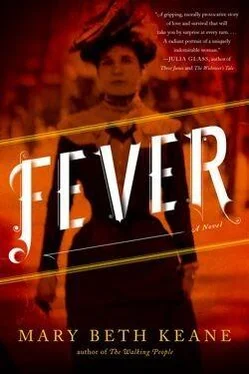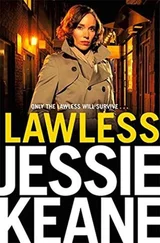He walked down to the stockyards, and then over to the train station, where several cargo cars were being coupled on the main track. When the railway man went inside the station house, Alfred walked along the track, peering into the dark cars. In one he sniffed corn. In another, buckwheat. In a third car he looked left and right and then noticed from within the darkness a pair of eyes. He felt a chill, and stepped back. “Get away,” a disembodied voice growled. “Or get out of sight.” Alfred climbed up and quickly moved to a shadowed corner. “Where is it going?” he whispered. “East?” As his eyes adjusted, he saw that the man was really a boy, fifteen or sixteen at most. Another voice said, “Boston.”
“Hold on, buddy,” the second voice said. “Are you sick?”
“No.”
“If you’re sick, we’re not getting help. You understand? We’ll bury you in this shit and leave you here.”
“I’m not sick.”
“You look kinda sick.”
“If you get us caught, I’ll kill you dead,” the first voice assured him as Alfred leaned into his bed of yellow peas. After a while, he heard the lock thrown in place on the other side of the door and the train began to rock toward the Atlantic.
HIS BANNER OVER ME IS LOVE
As she walked from St. John the Apostle to Dr. Tropp’s office, Mary clutched the torn-off corner of paper the nun had given her and prayed that Alfred had given the doctor his current address. She hadn’t seen him in seventeen months. Who had visited him in all that time he spent in the hospital? Who had made sure the doctors were doing their best? Not Liza, she thought with relief. But not Mary, either. He’d been alone in this horror while she’d been oblivious, making pastry downtown.
She had never before walked the neighborhood above Columbia University, and noticed that all the hectic life and energy of Morningside Heights was muffled and then silenced in the space of half a dozen blocks. Around the university were brownstones as beautiful as those on Park Avenue, and residential buildings with elevators inside. The sidewalks were neat, the lawns trim. Clusters of rosebushes punctuated the green spaces of campus like so many bright and shining jewels. But just above that, outside Dr. Tropp’s office on 129th Street, the sidewalks were silent, the trash bins unattended for weeks. The few automobiles scattered about the neighborhood were parked in every direction, some facing west, some east, some with their wheels up on the curb. There was a pigpen by the river, and the odor hung over the surrounding blocks.
No one answered her knock when she arrived at the doctor’s office, so she let herself in and caught him dozing at his desk. “Excuse me, sir,” she said, and when she was sure he was awake and paying attention, she told him that she was Alfred Briehof’s wife, just returned from abroad, and needed Alfred’s address. She looked around. There was no secretary. No patients. After hearing her business, the doctor’s expression became one of doubt, but he turned and searched his desk for a file. “Briehof,” he muttered as he moved papers back and forth. “I saw him only once since he came back from Minnesota. I can’t remember if he gave me an address.” Finally, he singled out a file from the mess and opened it. “Ah, yes,” he said, and Mary’s heart beat faster. “It’s 545 West 125th Street.”
Mary tried to check her anticipation, and reminded herself that she had not been kind to him the last time he tried to talk to her. Maybe he would turn her away now, just as she’d turned him away seventeen months earlier. Maybe the months he’d spent out west — doing what, Mary wanted to know — had taught him that the empty spaces in his life could easily be filled, and maybe he had no interest in Mary anymore. The satchel she’d been lugging around the city since leaving the boardinghouse felt much heavier than it had that morning. She thought of Mila and the boys, and wondered if Soper had gone looking for her there. She hoped Mila could convince him that she’d really left, and then Soper would leave them alone.
When she got to the building it seemed a little like a hotel, but one where the bellhop and the doorman had abandoned their posts years ago and left the lobby to be pulled down by cobwebs on the rafters, buried by mud tracked in from the street. She scanned the list of names beside the buzzers and there it was, halfway down. She pressed the button, and just as she began to worry that it didn’t work, she heard the sound of a man’s boots coming down the stairs. It didn’t sound like the step of a sick man, an incapacitated man, a man hobbled with injury and pain. She knew he’d spotted her through the glass of the door when the boots stopped. He pushed open the door and stepped outside.
“Mary,” he said, shoving his hands deep inside his pockets and leaning back on his heels. She noted the skin of his right hand, all the way up his arm to the place where his shirt was rolled to the elbow. His shirttail was hanging out over his pants, and he wore no socks in his shoes. There were dark rings under his eyes and his hair had more gray threaded through it than she remembered. But otherwise, he was himself, and within five seconds of seeing him again she knew that there was no Liza upstairs, no woman by any other name. She sniffed the air around him, out of habit, but smelled only aftershave, soap. His hair was damp, and he hadn’t yet combed it. She tilted her head and looked closer. He had none of that wolfish quality he had when he was drinking, always moving and itching to get out, always fiddling with something in his hands. Nor did he have that look he had back in 1909, when she’d seen him at the hearing. He was not full in the face, nor was he gaunt. He was not jumpy, and yet he gave off a gentle hint of impatience. She couldn’t quite read him.
“Can I come in?” she asked and watched his face as he noted her bag, the weight of it.
“Sure,” he said, as if he’d seen her the week before. He walked ahead of her down the long hall, but waited by the bottom of the stairs for her to go up ahead of him. “Second floor,” he said. He was quiet as he followed her up the stairs, his injured hand clutching the handrail. He moved slowly, carefully. When they got to the landing he nodded toward a door to her left and she pushed it open.
“I heard about your accident,” she said once they were both inside. She held out her hand so that he would show his injured arm. The skin there was raw, melted and cooled, and she wanted to run her palm over the surface, learn the new topography. There was no hair on that arm, and his hand appeared swollen, lumpy, as if it needed to be drained. She pressed the swollen part with her fingertip.
“It’s fine now,” he said. “I was lucky.”
“I just found out,” she said, as if this would explain why she hadn’t sought him out earlier. “Then Jimmy said you might have gone out west.”
“Ah,” he said, as if it didn’t matter to him. “I was planning on sending you a letter, but then…” He trailed off, distracted by something she couldn’t see or hear. He turned to the counter, began to open and close cabinet doors. His room was not neat, she noted, but it was not dirty. His bed was unmade but the sheets appeared clean. The counter was cluttered with mugs and bowls and spoons, but all seemed washed, left there to dry. Dirty laundry was piled in a corner instead of scattered everywhere underfoot. Once she understood that he was well enough to live in the world outside the hospital, she expected a scene, she expected to have to make her case to him right away, to roll up her sleeves and peel the years back and back and back until they were exhausted, and there was nothing further to say except what was new and now, and how they’d cope with tomorrow. She expected to have to draw a boundary and show it to him. She’d prepared herself for blame and had lined up a list of grievances she’d level at him if he implied for a second that their split was her fault. Instead, he seemed to barely register her presence.
Читать дальше












